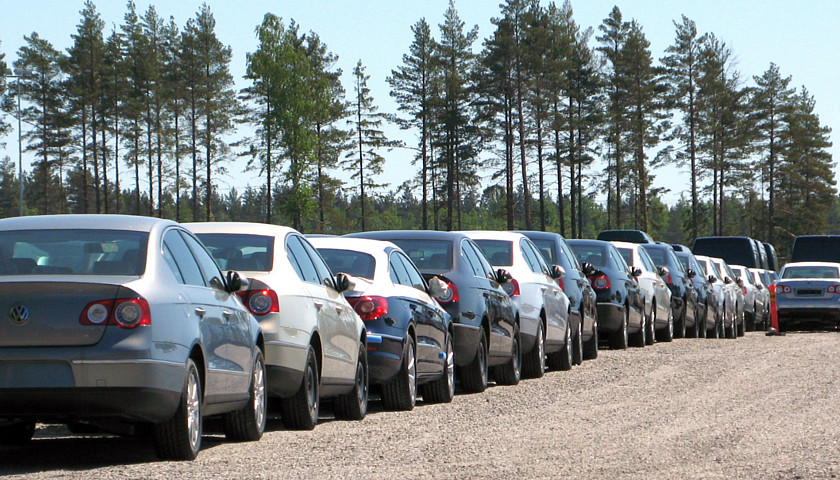by Gerard Scimeca
In this era of broad political division, one thing that still unites Americans is a deep and abiding dislike for those who seek to profit from cheating. Whether cheaters come in the form of athletes, such as cyclist Lance Armstrong and his use of performance enhancing drugs, or celebrity lip syncing phonies Milli Vanilli, America has a long and undeniable distaste for con artists.
Even President Trump himself, the exact opposite of a unifying figure, earned praise from some of his harshest critics when he targeted China and other nations as cheaters on trade deals. Rule breakers have a way of uniting even the strangest of bed-fellows.
The President, then — in fact all of Washington — may want to turn a keen eye toward Volkswagen, who in the midst of one the greatest corporate scandals in history is still putting their finger on the scale, and trying to hoodwink consumers. At a time when they should be on their best behavior, the German automaker is still a long way from making amends and cleaning up their mess. It’s high-time lawmakers held them accountable.
Currently, Volkswagen (VW) is still going through the blowback phase from the revelation in 2015 they had been for years deliberately installing “cheating software” on millions of autos to deceive emissions tests. Eleven million customers worldwide – including over 600,000 in the U.S. — were defrauded into purchasing vehicles they thought had low emissions, when in reality they were spewing pollutants 30 to 40 times over the legal limit. In 2017, VW pleaded guilty in federal court to fraud and conspiracy, and made a deal with the Justice Department that included $4.3 billion in criminal and civil fines, as well as an agreement to have their corporate operations monitored to ensure steps are taken to prevent future cheating.
According to an August report issued by the monitor, former Deputy Attorney General Larry Thompson, VW operates in a “corrupt culture,” and he is yet unable to conclude whether Volkswagen is fully complying with the conditions of the plea agreement. It seems old habits die hard. Volkswagen is still facing criminal investigations in Germany, with accusations they are refusing to turn over requested documents. There is more trouble from a half-dozen investor lawsuits commencing in Europe, where plaintiffs claim that VW deliberately withheld information regarding their criminal behavior to the detriment of shareholders, who lost millions of dollars in value when the scandal was exposed.
German media and legal opponents of the company further claim that new and current Volkswagen CEO Herbert Diess had knowledge of the cheating scheme and said nothing before Volkswagen was caught. German law enforcement is still gathering evidence and weighing whether to press criminal charges against Diess and the former president of VW subsidiary Audi, Rupert Stadler, who remains under house detention in Germany. Amazingly, Stadler remains on Volkswagen’s management board.
By any measure Volkswagen is not putting the cheating scandal behind them, but basking in it. Volkswagen management is still protecting top executives in the crosshairs of ongoing criminal investigations and lawsuits, claiming they had no knowledge of the cheating conspiracy, despite mounting evidence suggesting otherwise. These executives could very well be in U.S. prison, if not for the Germany’s policy of non-extradition. At least this was the point suggested by U.S. District Court Judge Sean Cox when he sentenced a mid-level VW executive, Oliver Schmidt, to seven years in prison last year. Lawsuits from former mid-level executives who claim they were fired as scapegoats to protect upper management are not helping Volkswagen’s case.
The ongoing refusal of Volkswagen to clean-up their deeply corrupt culture is not only a matter of justice and basic corporate responsibility, but deeply important to U.S. consumers. Currently, roughly 300,000 vehicles recalled due to the scandal are sitting in over 30 lots across the U.S., and Volkswagen would very much like to get them back on U.S. roads. VW claims the cheating software has been removed, and the cars are now “fixed,” but even after modifications the cars are years old, their condition hasn’t been verified, and they still pollute way over legal limits.
Astoundingly, no other country including Germany itself is permitting Volkswagen to resell recalled vehicles, only the U.S., for reasons still known only by those who arranged the plea agreement. It is somewhat of a slap in the face to consumers here that Volkswagen is promoting heavy discounts on newer fuel-efficient vehicles in other countries, while pushing mountains of old and high-emission cars on U.S. customers that still pollute twenty times above the legal limit.
As President Trump has demonstrated, and Congress has learned through his example, America shouldn’t be shackled to bad deals made in the past that hurt consumers and undermine our economy, especially to benefit cheaters. Any deal that permits Volkswagen to sell hundreds of thousands of recalled and still-polluting cars to U.S. consumers, while their leadership remains under widespread criminal investigations, should be torn up. When VW shows America that they’ve truly changed their ways and replaced their corrupt management, then we can talk. That should be an idea we can all unite around.
– – –
Gerard Scimeca is the Vice President of Consumer Action for a Strong Economy (CASE).






[…] entire editorial is available here on The Tennessee […]